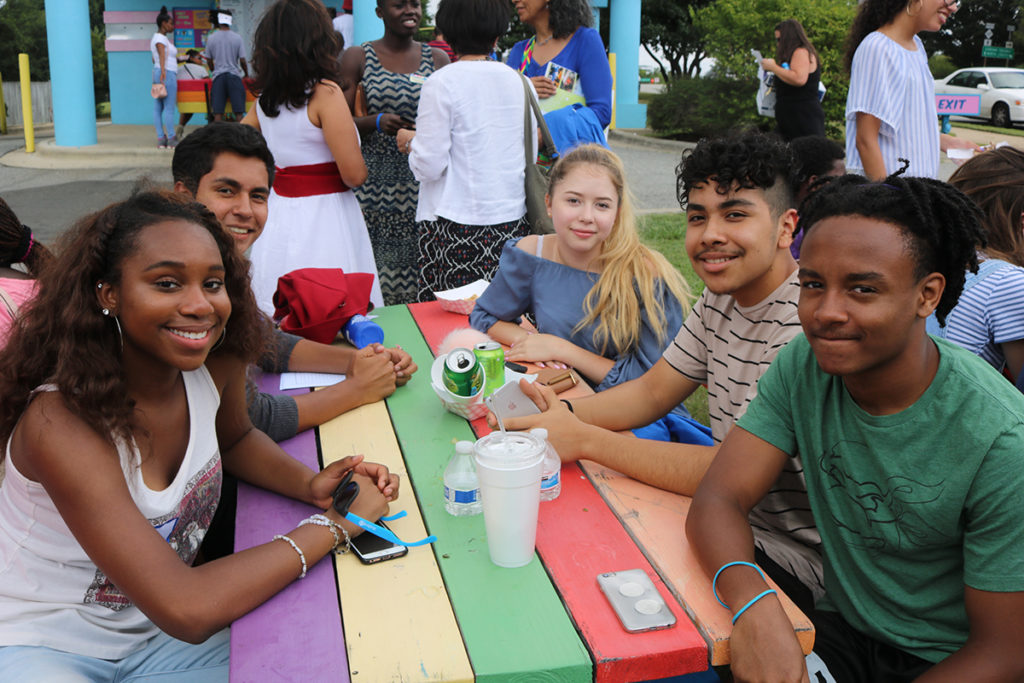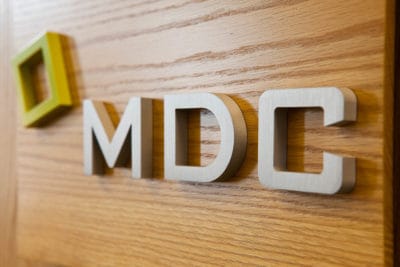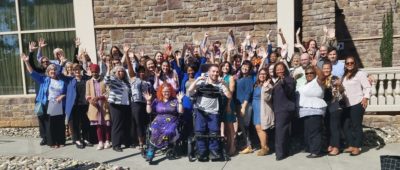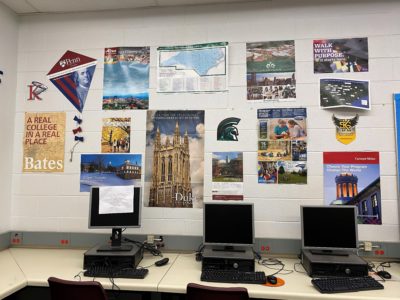
This year, Durham-based MDC chose nine organizations to join a program called “Learning for Equity: A Network of Solutions” — or LENS-NC. The program aims to improve outcomes for students at the intersection of race, income, and learning differences. This article is part of a series introducing our readers to these nine organizations.
As a rising sixth-grader, Angelica Cohen was excited about middle school. But when her parents dropped the news that she’d be doing summer school first, her excitement dimmed. She thought summer school was just for “kids who were bad.”
As she arrived at the inaugural summer academy at Student U, her mood changed immediately.
“I’ll never forget the first day, all of a sudden there was this group of college students lined up at carpool, and they’re clapping and singing at 8 a.m.,” she said. “That threw all of us for such a loop, and I think that energy just became so contagious. It really set the tone for, like, this isn’t some regular, boring summer school.”
That was in 2007, when the first fruit was born from a meeting of 14 people in Durham. They dreamed about a better way to reach students in the community. The result was Student U, a group that helps aspiring first-generation college students.
“It has changed my life,” Cohen said. “It has made the difference between moments of quitting and moments of success. I personally attribute a lot of who I’ve become to this program.”
Addressing systemic issues
Studies and data gathered by The Pell Institute show a cyclical poverty trap for Black and Brown students, as well as those in low-income households.
They have lower rates of high school graduation compared with white and higher-income students. Tracking the data forward, they also:
- are less prepared for college according to ACT benchmarks;
- are not as likely to enroll in college;
- are less likely to graduate from college;
- have lower income potential.
These data are especially relevant in Durham, where U.S. Census Bureau estimates in 2019 showed African-Americans and Hispanics composing more than 50% of the county, with a per capita annual income of $34,000.
Student U was established because a group of Durham leaders wanted to see those numbers change. They focused on breaking cycles — addressing intergenerational wealth by helping children become the first in their families to attend and graduate from college.
“Within an educational system that fails to allocate resources equitably, Student U sees brilliant students and engaged families who know that they’re capable of incredible things,” its website says. “And we’re here to walk alongside them.”
In 13 years, Student U has served more than 600 students. For students who complete the program from sixth to 12th grade, it boasts a 100% high school graduation rate. To date, 90 Student U high school graduates have enrolled in post-secondary education.
Watching families gain brighter outlooks is one of Andrea Rodriguez’s favorite parts of working at Student U.
“Just to see the student’s face and to see the parents’ faces,” said Rodriguez, a bilingual families advocate. “It’s a lot of work by everybody, and just to see that joy and that they know they’ve accomplished something. And to know we were a part of something that important.”
Preparing future college students
Helping the population Student U serves is not a matter of providing quick answers over the phone or one-off services. Participation is an 11-year commitment, where staff and volunteers consistently support students from sixth grade onward.
“It’s building a foundation with their grades and volunteer or internship opportunities, helping them get to college, and then also we have a college program to help them get through college,” Rodriguez said. “So it’s the whole way.”
It begins the summer before sixth grade when Student U kids attend Middle School Summer Academy. The students receive instruction in four core subjects – English, math, science, and “Global Connect” — and choose an elective. The program combats summer learning loss and boosts confidence for the upcoming school year.
During the school year, students attend a three-hour after-school enrichment program at Student U. They work on academic goal-setting and study sessions, and they participate in clubs focused on leadership, STEM, arts, or athletics.
In 11th and 12th grade, students land internships, jobs and volunteer opportunities in the community to learn about their passions. Student U also pairs them with in-school advocates, who are Durham Public Schools teachers or counselors. The students also get twice-a-week tutoring at Student U.
Realizing the college dream
Navigating the college application process can be harder for first-generation students who can’t lean on their families’ experiences.
Rodriguez was called to Student U work because of her own experience as a first-generation college student.
“My parents were like, ‘You’re going to go to college, you’re going to go to college. You have to get good grades,’” Rodriguez recalled. “And I think I focused so much on good grades, when it came to figuring out what getting to college looked like, I was like, I have no clue where to start.”
That’s part of the need Student U tries to fill.
Student U provides enrichment and extracurricular opportunities for participants. In junior and senior years, it sets up college tours.
The program also walks with students throughout the application process. It coaches students on picking schools that will be a good fit. It works with families to explain application and financial aid forms.
Rodriguez finds extra meaning in this work because she’s helping students think through things she never considered when she applied to college.
“I wish I would have had these resources,” she said. “So if I can give someone access to things I didn’t have access to, that’s great.”
Cohen is a testament to how powerful that kind of help can be.
“To motivate somebody and say the sky’s the limit, it’s amazing,” she said. “It really encouraged me to want to enjoy and experience college as opposed to it being, this is where my parents want me to go.”
Empowering graduates and community citizens
The program continues after students enroll in college through Student U’s College Promise program. The program provides academic, social-emotional, and financial support for participants. There’s also a mentoring component where more senior Student U students mentor newer ones.
Some of the supports are meant to help students become successful academically. Other supports are intended to help students gain the confidence to succeed in life beyond the classroom.
“I don’t think you can find one person that’s gone to Student U who wouldn’t say that it has changed their life, even outside of education,” Cohen said. “They really taught us how to have joy in the world. They taught us to value and love education. How to love ourselves and how to pass that along.”
Watching what often happens after college is a testament to what Student U means in the lives of these youths.
“A lot of our older students, a lot of them are so happy to come back and volunteer their time and energy to help our current program,” Rodriguez said. “If it was so impactful for them that they want to give their time to us, that makes you feel like you made an actual difference in someone’s life.”
Through LENS-NC, this is what they’re adding to the mix
Student U’s service population already faced systemic obstacles to academic success. Through work with the Learning for Equity: A Network of Solutions (LENS-NC) effort, Student U wants to strengthen its supports for participants with learning differences.
Student U will study and learn from network partners how to:
- Individually support students with learning differences;
- Help these students and families understand the Individualized Education Plan process and advocate for their needs;
- Share best practices with the Durham community.
Rodriguez said Student U is well-positioned to work with families and the community to improve outcomes for students who learn differently. The consistency of the program over 11 years, and capping each Student U class at 50 students, allows them to get to know families well.
“I approach my job like how I would want someone to treat my family,” she said. “I think I connect a lot to the job in that way, because I feel like these families are an extension of my own.”



